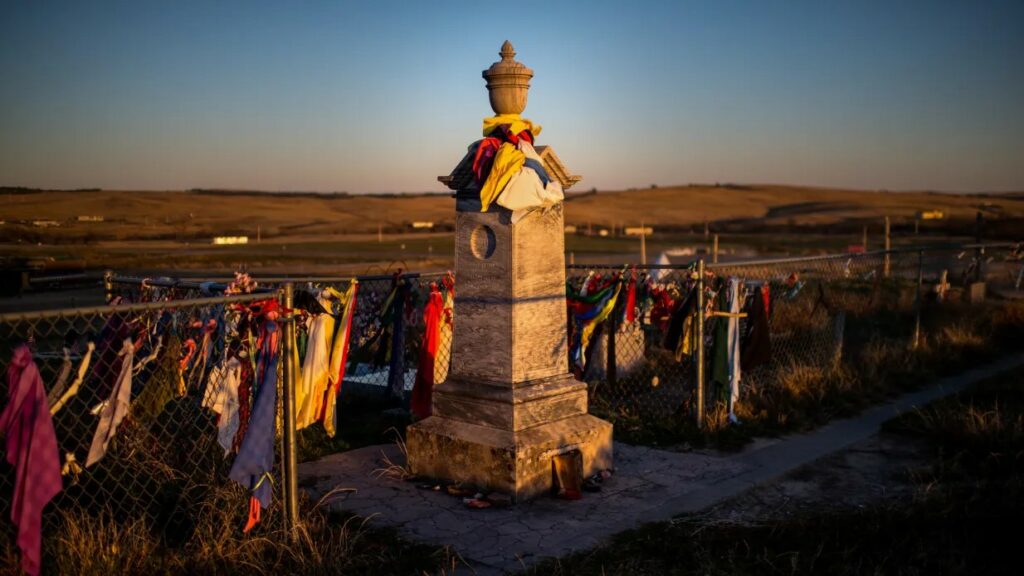The military awarded 20 men its highest honor in the 1890s for their role in the incident, where hundreds were killed or injured. Wind flutters around the peace offerings of tobacco ties that line the fence at the Wounded Knee Memorial on Pine Ridge Reservation in South Dakota, on Monday, October 20, 2014. (Photo by Nikki Kahn/The Washington Post via Getty Images) The Washington Post Secretary of Defense Lloyd Austin formally ordered the military to review 20 Medal of Honor awards given to soldiers from the U.S. Army’s 7th Cavalry for their actions during the 1890 Wounded Knee Massacre. The review, announced on July 24, calls for a special review panel to determine if some of the awards were wrongly given and should be rescinded. They are
Topics:
Bill Haskell considers the following as important: Education, history, Medals of Honor
This could be interesting, too:
Ken Melvin writes A Developed Taste
NewDealdemocrat writes Constitutional Interregnum
Bill Haskell writes Know Nothings
Joel Eissenberg writes The Trump/Vance Administration seeks academic mediocrity
The military awarded 20 men its highest honor in the 1890s for their role in the incident, where hundreds were killed or injured.
Wind flutters around the peace offerings of tobacco ties that line the fence at the Wounded Knee Memorial on Pine Ridge Reservation in South Dakota, on Monday, October 20, 2014. (Photo by Nikki Kahn/The Washington Post via Getty Images) The Washington Post
Secretary of Defense Lloyd Austin formally ordered the military to review 20 Medal of Honor awards given to soldiers from the U.S. Army’s 7th Cavalry for their actions during the 1890 Wounded Knee Massacre.
The review, announced on July 24, calls for a special review panel to determine if some of the awards were wrongly given and should be rescinded. They are instructed to go through each soldier’s individual actions, “to ensure no awardees were recognized for conduct inconsistent with the nation’s highest military honor.” It’s a move by the Department of Defense that comes after years of urging by Native American groups and some lawmakers.
The massacre took place at Wounded Knee Creek in the Pine Ridge Indian Reservation on Dec. 29, 1890. The 7th Cavalry had located and surrounded a group of Lakota people and was trying to disarm the camp. How the fighting started is unclear; according to multiple accounts a gun was fired either by accident or confusion during the surrender, prompting Army soldiers to open fire at the Lakota. The exact number of casualties is in dispute, but according to the Pentagon, between 350-375 Lakota were killed or wounded by the Army. Accounts written by witnesses and participants in the battle documented women, children and even babies among those killed. Dozens of American soldiers were killed as well, but witnesses described it from being in part from friendly fire.
20 soldiers received the Medal of Honor for actions at the massacre. They were among 31 total recipients of the award for the overall campaign that year. The awards were given out in a period between 1891-1897. The specific citations for each individual award are often slim, with Austin’s memo noting they simply note a soldier’s bravery or fighting while wounded.
The Wounded Knee Massacre became a symbol of the violence and oppression done against Native Americans. In 1990, 100 years after the slaughter, the U.S. Congress issued a formal apology. The medals were not reviewed though. The Pentagon’s order this week comes after a recent push by lawmakers in Congress to get the Medals of Honor reviewed.
Austin’s order calls for the panel to review the specific actions of each soldier and not the wider battle, although it notes that “[t]he [special review panel] may consider the context of the overall engagement as appropriate, including as necessary to understand each [Wounded Knee Creek Medal of Honor] recipient’s individual actions.” Additionally, the panel is asked to determine if the awards given in the 1890s meet the standards for such honors at the time they were given, not the present day.
Per Austin’s memo, the panel must provide a written report to the secretary by Oct. 15. The order calls for a final recommendation to be given on whether or not the soldiers should keep the nation’s highest military honor, or if they should have it rescinded, and with a full argument for or against each decision.
Task and Purpose, Nicholas Slayton

